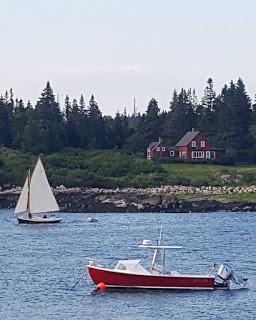
Vinalhaven, Maine by Marie Lossky
(@Marie.Lossky on Instagram)
Because it’s the time of year when many of us in the Northern Hemisphere are at least thinking about vacations, if not actually taking them, I thought I share some ideas for ways to rest and recharge with yoga. You can use them to create a yoga staycation in your own home or you can take them with you if you leave town to help enhance the vacation-ness of your vacation.
1. Explore Savasana

- Align your body
- Remain still
- Use a mental focus
- Maintain your awareness as you come out of the pose
For information on the pose, see:
Featured Pose: Relaxation Pose
How to Prepare for and Practice Savasana
Savasana (Corpse Pose) Variations
For a sequence to practice to prepare for Savasana, see: Featured Sequence: Preparing for Savasana
For inspiration about why and how to practice Savasana, see:
Roger Cole on Savasana: The Mind Coming into Equilibrium and Drawing Inside and Quieting
Tias Little on Savasana: The Practice of Savasana, Part 1 and Part 2
Richard Rosen on Savasana: The Value of Not Doing
2. Practice Restorative Yoga
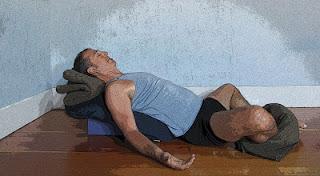
Although we don’t have all the restorative poses on our site, we do have information on these:
Featured Pose: Child’s Pose for information on the restorative version of Child's pose.
Featured Pose: Reclined Twist for information on the restorative version of Reclined Twist.
Featured Pose: Supported Backbend
Reclined Cobbler’s Pose
Bridge Pose for information on the restorative version of Bridge pose.
3. Practice Supported Inversions
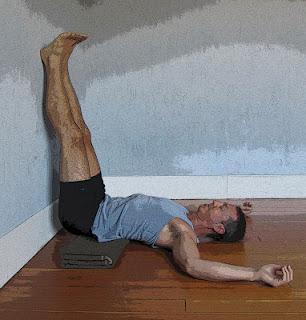
Supported inverted poses are particularly effective for reducing stress and quieting your mind because these yoga poses use gravity to trigger the relaxation response through the mechanisms that control your blood pressure. You don’t need a mental focus (although you can use one). As long as you are warm, quiet, and comfortable in the pose, all you have to do is let the pose work its magic. See Why You Should Love Your Baroreceptors. For your yoga staycation, you can add more or more of these poses to your regular practice or even do a practice focused exclusively on them, such as Featured Sequence: Easy Supported Inverted Practice.
Caution: Not everyone can do supported inverted poses safely. See Friday Q&A: Caution for Inversions for information.
For an overview of supported inverted poses in general (and to see photos of all of them), see All About Supported Inversions. For information on individual poses, see:
- Featured Pose: Legs Up the Wall Pose
- Featured Pose: Standing Forward Bend
- Featured Pose: Wide-Legged Forward Bend
- Featured Pose: Chair Shoulderstand
- Featured Pose: Half Plow Pose
- Featured Pose: Bridge Pose for information on version 4 (with a bolster)
- Featured Pose: Easy Inverted Pose
4. Make Any Practice More Gentle
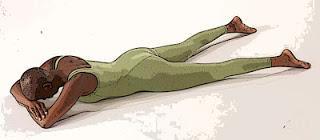
Crocodile Pose (Makrasana)
Why not treat yourself to a gentle practice now and then? Or maybe even a whole week of gentle practices? If you have a strong home practice, it will be interesting to see what affects a gentle practice has on you. And if you don’t yet have a home practice, a gentle practice is the perfect way to start. Here are some tips for making any existing practice (including the ones on our site—search under “Featured Sequence”) into a gentle practice.- For dynamic poses, do fewer repetitions, for example, do 3 rounds of dynamic Warrior 2 instead of 6.
- For static poses, use shorter holds, for example, hold Warrior 3 pose for 3 breaths instead of 6.
- For restorative poses, extend your time in the poses.
- Leave out the most vigorous pose or poses from the sequence, either just skipping them or replacing them with gentle or restorative poses.
- Between active poses, rest in Relaxation pose or another resting pose.
- Relaxation Pose (Savasana): Especially good between supine poses (on your back).
- Crocodile Pose (Makrasana): Especially good between prone poses (on your belly), such as Locust and Cobra. (See above for photo.)
- Easy Sitting Pose (Sukasana): Especially good between seated poses, such as twists.
- Moutain Pose (Tadasana): Especially good between standing poses.
- Child’s Pose (Balasana): Especially good after inverted poses and prone poses.
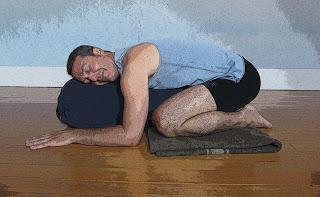
By the way, you don’t have to do these practices sitting up! For your staycation, try them in any restorative pose (Reclined Cobbler’s pose and Child’s pose are good choices) or any gentle inverted pose, such as Legs Up the Wall pose, Easy Inverted Pose, or Bridge pose with straight legs. I personally have found the combination of Legs Up the Wall pose with extending the exhalation to be extremely relaxing.
If you have never practiced simple breath awareness, that’s the best place to start. See A Balm for the Soul: Practicing Simple Breath Awareness.
For calming breath practices, see Calming Breath Practices We Recommend and Pranayama for Everyone: Bhramari Breath.
For balancing breath practices, see Breath Practices for Balance.
6. Guided Relaxation and Meditation
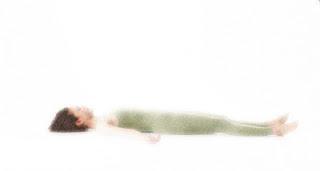
And how about treating yourself to a guided meditation? Jill Satterfield has several wonderful guided meditations of different lengths on her youtube station.
Subscribe to Yoga for Healthy Aging by Email ° Follow Yoga for Healthy Aging on Facebook ° Follow Baxter Bell Yoga on Instagram ° Join this site with Google Friend Connect

